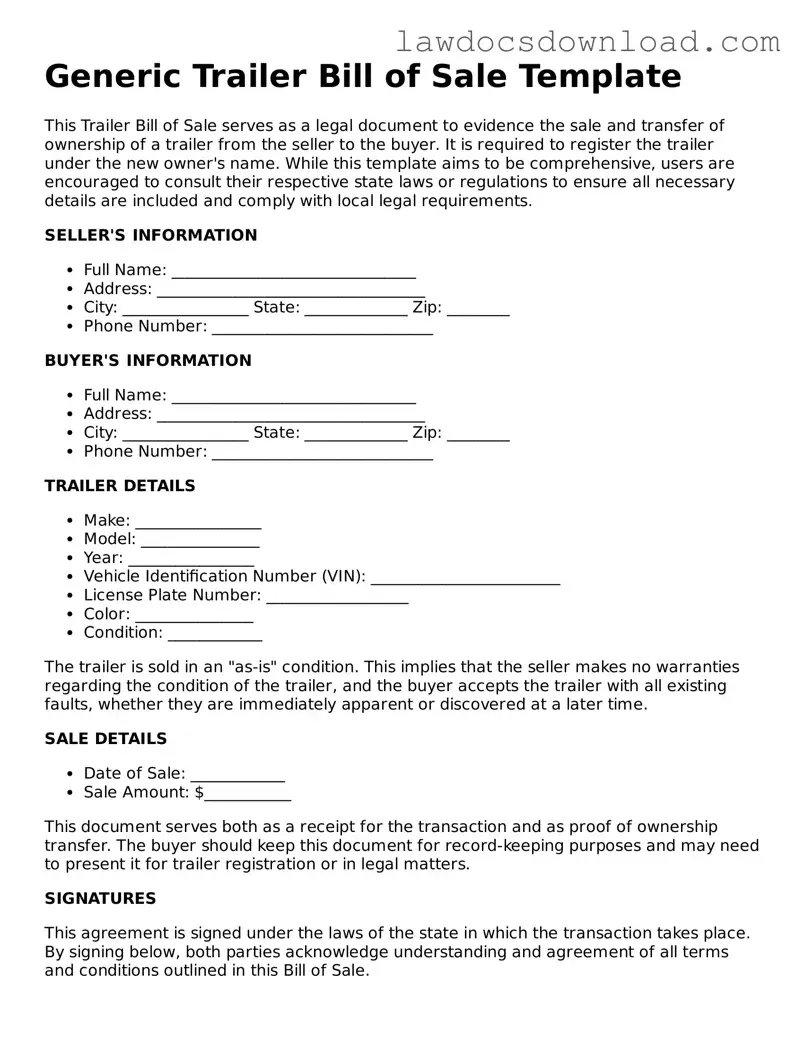The Vehicle Bill of Sale is quite similar to the Trailer Bill of Sale, as both serve as legal documents that prove the sale and transfer of ownership from a seller to a buyer. These forms document the details of the sale, such as the make, model, year, and identification numbers of the vehicles or trailers involved, along with the sale price and the date of sale. They also include the names and signatures of both parties, establishing a legally binding agreement regarding the transaction.
A Boat Bill of Sale shares similarities with the Trailer Bill of Sale, especially when the trailer is used for towing a boat. Like the trailer form, it records the sale of a boat, detailing the vessel's specific information such as make, model, year, and hull identification number. Both forms act as evidence of the transaction and are crucial for the registration process of the item sold, whether it's a boat or trailer.
The Equipment Bill of Sale is another document akin to the Trailer Bill of Sale. This form is used when buying or selling heavy or large machinery and equipment. It outlines the item's sale, including details like the make, model, and serial number, which are crucial for identifying the equipment. Both documents serve to protect the rights of the buyer and the seller by providing a legal record of the transaction and the item's condition at the time of sale.
The Firearm Bill of Sale resembles the Trailer Bill of Sale as it is used to document the sale and transfer of ownership of a firearm from one party to another. It includes specific information about the firearm, such as make, model, caliber, and serial number, alongside the sale price and the parties' details. This document is particularly important for proving ownership and for legal accountability, much like the Trailer Bill of Sale is for trailers.
The Business Bill of Sale is related to the Trailer Bill of Sale but focuses on the transaction involving the sale of a business. It outlines the details of the sale, including the business's assets, which may sometimes include trailers or vehicles used in business operations. This document serves a similar purpose by confirming the transfer of assets (or the business itself) from the seller to the buyer and detailing the terms of the sale.
The Livestock Bill of Sale closely mirrors the Trailer Bill of Sale in context, where the former is utilized for the sale of animals such as cows, horses, and other livestock. It documents the transaction, providing specifics on the animals sold (e.g., breed, gender, age), ensuring there's a legal record of the sale. This is especially important for registration purposes and proving ownership, akin to what a Trailer Bill of Sale does for trailers.
The Mobile Home Bill of Sale functions similarly to the Trailer Bill of Sale, particularly because a mobile home can be considered a type of trailer. This document records the sale of a mobile home, detailing its make, model, year, and serial number, similar to how a Trailer Bill of Sale outlines the specifics of a trailer transaction. Both documents are vital for establishing legal ownership and are required for registration with relevant authorities.
The Pet Bill of Sale is akin to the Trailer Bill of Sale, although it covers the sale of pets instead of trailers. This form includes details about the pet, such as breed, age, health information, and the transaction details, like sale price and date. While dealing with living creatures rather than property, it serves similar legal purposes by documenting the transfer of ownership and establishing the terms agreed upon by both parties.
The Furniture Bill of Sale, while focusing on items within a home, shares the purpose of proving ownership transfer through a documented sale, just like the Trailer Bill of Sale. It lists the specifics of the furniture sold, including identification details and condition, and records both parties' agreement on the sale price. This form is essential for legal proof of ownership and protection in case of future disputes, emulating the protective nature of the Trailer form for furniture transactions.

